Amber Fort in Jaipur: Everything You Need to Know
While visiting Jaipur Amber Fort is a must-visit attraction. This magnificent fort, also known as Amer Fort, is a UNESCO World Heritage Site and offers a captivating glimpse into the rich history and architecture of Rajasthan. With its stunning blend of Rajput and Mughal styles, exploring the intricate palaces, courtyards, and gardens within Amber Fort is an experience that should not be missed during your visit to Jaipur.
Also read: Incredible India’s UNESCO Gems: A Traveler’s Delight
History of Amber Fort
The history of Amber Fort has seen the rise and fall of multiple dynasties, as well as several skirmishes and sieges. It bears witness to the Rajput era's rich cultural history and architectural brilliance. It is today a well-known tourist site, attracting visitors from all over the world to marvel at its magnificence and learn about its fascinating history. The Amber Fort, a historical relic dating back to 967 CE, is a tribute to the magnificence and richness of the Rajput emperors. Alan Sign, the ruler of the Chanda tribe in Meenas, erected the fort, which features magnificent marble sculptures, mirrorwork, and paintings.
Raja Man Singh of the Kachwaha clan constructed Amber ka Kila on the ruins of the ancient edifice in 1592. The fort was regularly refurbished during the Rajput monarchs' reign, with Sawai Jai Singh building the Amber Palace. However, the capital of the monarchy was shifted to Jaipur, and no additional modifications were carried out. The name Amber Fort is derived from the earlier name Dhundhar, which was then abbreviated to Amber and Amber.
Architecture
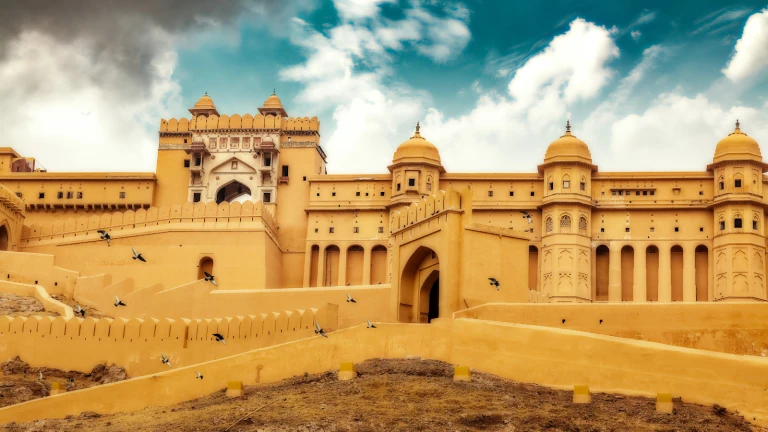
The Amber Fort was constructed using red and white sandstone as well as marble, blending Hindu and Mughal architectural traditions. It is split into four courtyards and has sculptures of Hindu gods and goddesses on its walls and ceilings. Rajput constructions add charm. The fort's construction has exquisite marble inlay work, delicate frescoes, and complex mirror work.
It is well-known for its defensive features, including watchtowers, gates, and reinforced walls. The fort also has remarkable structures such as the Sukh Mandir, Ganesh Pol, and Sheesh Mahal. Inside the fort, visitors may see the splendor of Rajput emperors and their rich culture.
The fort is a must-see location for history and architectural lovers and provides spectacular panoramic views of the nearby Aravalli Hills. The walls of the palace are decorated with murals of illustrious Rajput kings and vintage hunting motifs. The lake view and the verdant garden give the area a calming appeal. The fort's advantageous hilltop location gives it a majestic feel and a commanding view of the entire city below.
Today's Amber Fort

Amber Fort is currently one of Jaipur's most popular tourist destinations. Visitors from all over the world come to the palace because of its lengthy history and stunning surroundings. The palace's elaborate design and exquisite craftsmanship may be explored by guests, who can also take advantage of cultural events and elephant rides. Due to the fort's prominence, it has become a hive of activity, with lively marketplaces and neighborhood merchants selling traditional Rajasthani handicrafts and food.

The palace, a UNESCO World Heritage Site, has been acknowledged for its significant contribution to safeguarding cultural heritage, enhancing its appeal on a global scale, and supporting local conservation efforts and sustainable tourism practices.
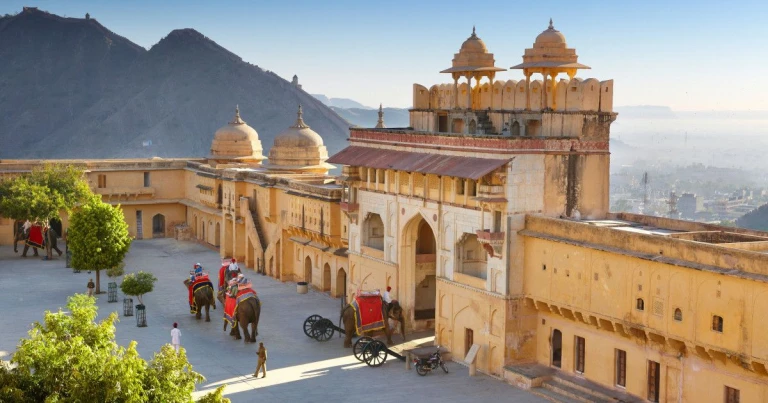
Bollywood directors frequently use the Rajasthani fort as the backdrop for historical films like Jodha Akbar, Baji Rao Mastani, and Bhool Bhulaiya. Rajasthan's rich cultural legacy is enhanced by the fort's beautiful architecture, historical atmosphere, and brilliant hues. Due to the fort's fame, more people are traveling to the area to see its splendor and recreate the enchantment of their favorite movies.
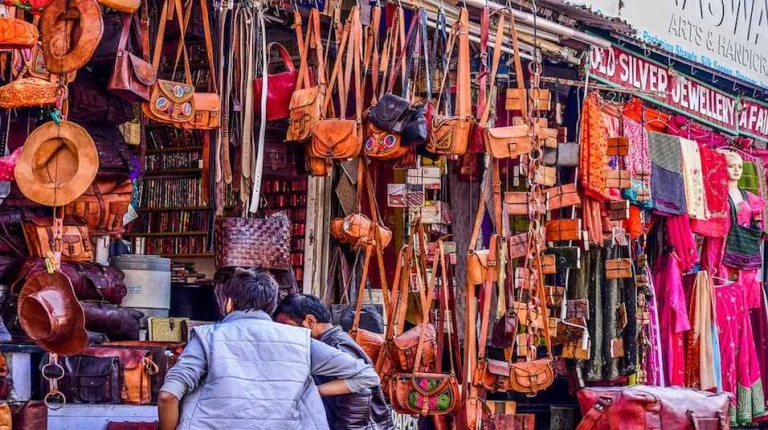
Visitors may have a distinctive experience at the Amber Forts, which include stores offering handicrafts and home furnishings made traditionally in Rajasthan. Textiles, pottery, jewelry, and other distinctive mementos offer a look into Rajasthan's thriving culture. The palace is a must-see location for movie buffs and art aficionados due to its affordable admission prices.
How to reach Amber Fort
The Pink City is located 11 kilometers from Amber Fort. You may use a private automobile or the daily city bus to go to Amber. To get to Amber Fort, you can alternatively choose to ride a rickshaw or hail a cab. For those searching for a hassle-free way to visit the fort, the city bus is a practical and affordable option.
There are three methods to get to the hilltop where the fort is located:
If you want to visit the palace in a regal manner, choose the Amber Fort elephant ride.
You can ride in one of the available jeeps to ascend the Amber Fort.
You have the choice of going up the historic steps or just taking a short uphill walk to get to the fort.
Sound and Light Show at Amber Fort

The Amber Fort's laser light show, which takes place as Rajputana-era tales are being read, is a must-see attraction. This show celebrates the masters of folk music while spotlighting local mythology and tradition to offer us a taste of Rajputana beauty. The location, which is normally absolutely black, seems surreal because of the light and sound show.
Visitors are immersed in local mythology and culture throughout the performance at the base of Amber Fort on Maota Lake in Kesar Kyari, adding to the magnificence of the encounter. A distinctive and magical environment is produced by the location itself, which has water on three sides of the eating room. It is advised to get there at least 25 minutes early in order to experience the performance in its entirety.
50-minute sessions are held twice daily, at sunset and after dark.
Hindi (8:30 PM) and English (7:30 PM)
Admission: ₹295 rupees per person.
When to Visit Amber Fort and How Much Time Is Needed
Plan to spend at least 3 hours touring the Amber Fort about 4 PM when the sun is not directly above if you want to properly enjoy it. After touring, as you wait for the light and music spectacle to start, ascend to the top for a stunning view of the setting sun.
Attractions in Amber Fort
You may tour this beautiful fort in more than three hours. Here are a some of Amber Fort's must-see sights.
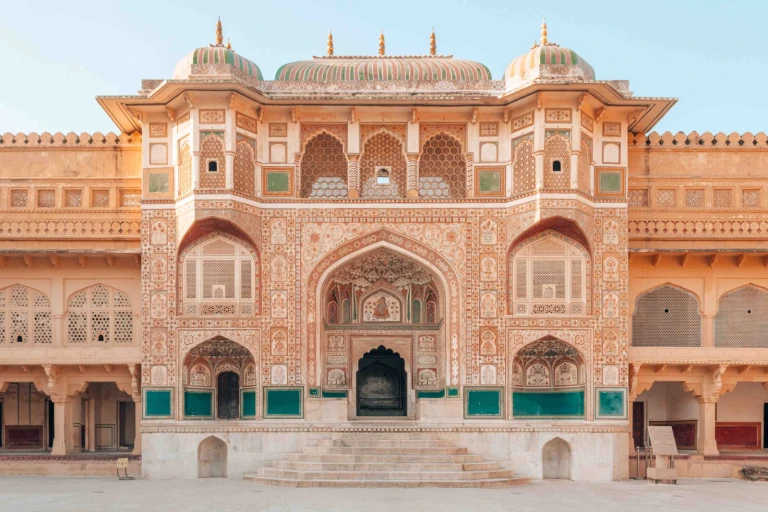
Suraj Pol is the fort's main entrance. Many Bollywood films' historical settings typically employ this zigzag route. To get here, you may ride an elephant.

Jaleb Chowk, the first significant courtyard of the fort. Soldiers used to congregate there in the past. The courtyard is encircled by stunning construction that provides a window into the fort's colorful past. The magnificent Sheesh Mahal, renowned for its exquisite mirror work and dazzling beauty, is also accessible from Jaleb Chowk. You may access the fort's second courtyard by ascending a short flight of stairs from the Jaleb Chowk, which also houses the well-known Shila Devi Temple, known for its animal sacrifice ceremony.
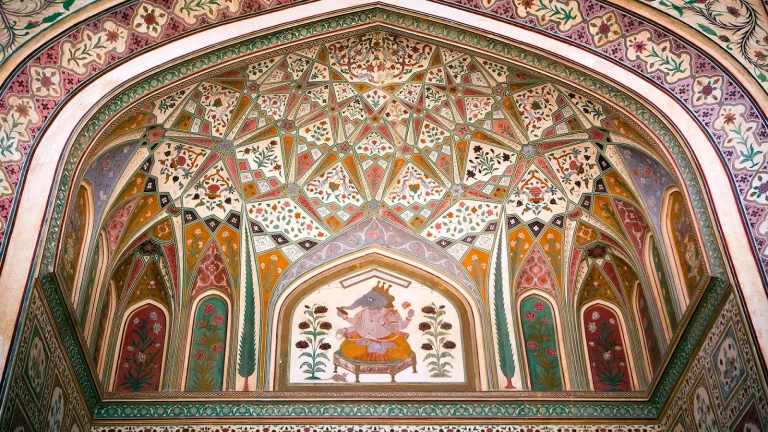
Ganesh Pol, the most popular gate of Amber Fort in Jaipur, is known for its creative brilliance. The exquisite carvings and frescoes that cover the Ganesh Pol gate demonstrate the period's talented craftsmen's work. It is a well-liked location for both visitors and photography aficionados due to its stunning patterns and brilliant hues. You will be taken back in time and immersed in the splendor and rich history of Amber Fort as you walk through this majestic gate. It serves as the primary entrance to the palace and contains a few little windows for the royal women to use to look at.
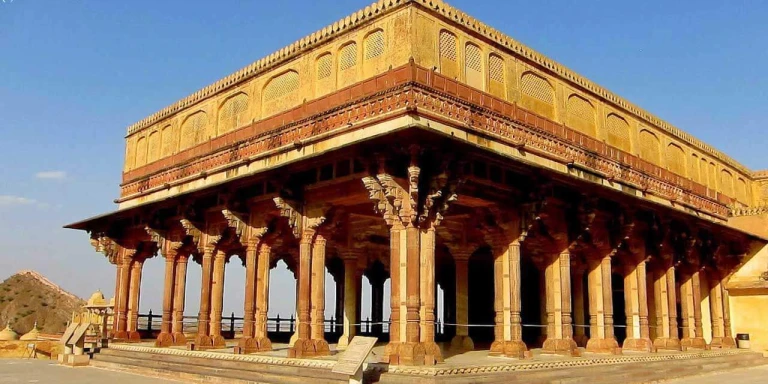
The hall for general public is called Deewane-E-Aam. This is located just across from Ganesh Pol. The king would address the populace at this palace and listen to their complaints. The Deewane-E-Aam is a large hall that displays the luxury and grandeur of the Mughal Empire via exquisite carvings and lovely artwork. The hall is an important component of Amber Fort's historical significance because it exhibits the value put on the king's relationship with his people through its construction and design.
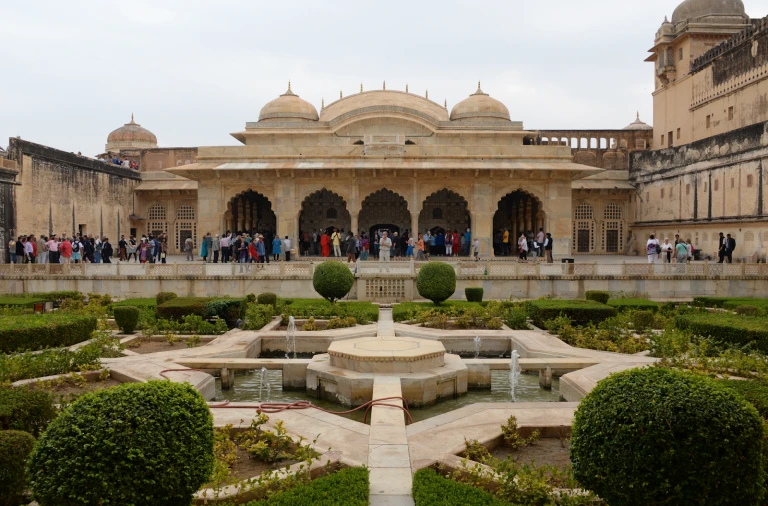
Jai Mahal, also called Deewane-A-Khas, is a special audience room where royal guests had only-access meetings. Its elaborate carvings and artwork highlight the king's significance and exclusivity while reflecting the richness and majesty of the Mughal Empire. On the pillars of Deewane-E-Khas are images of the renowned mystical flower of the Mahal. Bathing rooms with khus curtains are also found in the leisure area known as Jai Mandir.
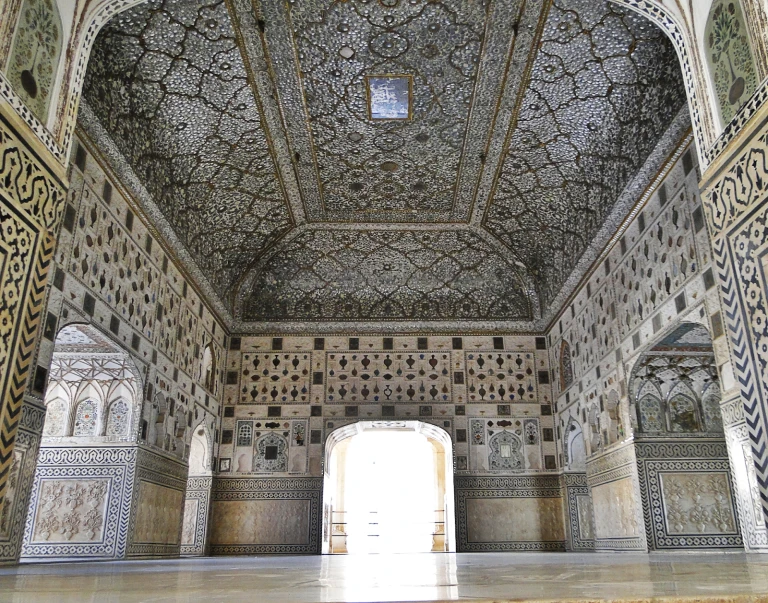
The Sheesh Mahal is the area of the palace that receives the greatest attention and visitors. The castle is illuminated by a single candle, and the ceiling resembles a starry night sky. Famous for its elaborate mirror work, the Sheesh Mahal reflects candlelight to create a bewitching appearance. The Sheesh Mahal is supposed to have been built to seem like the night sky, giving visitors a sense of peace and wonder.
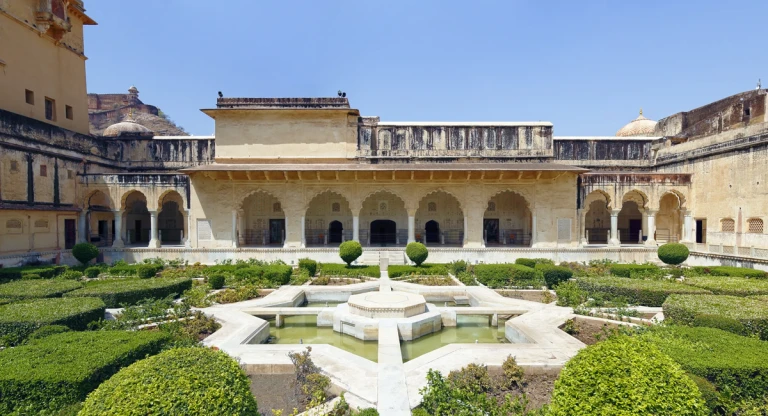
The king's sleeping chambers are called Sukh Niwas, and they are situated across from the working room. Sukh Niwas is renowned for its lavish furniture, cozy atmosphere, and tranquil hues. The king may unwind and reenergize there after a demanding day of reigning. It offers a peaceful getaway for him. The chamber is decorated with amazing woodwork and artwork that displays the riches and magnificence of the palace. The many queens of the king's residences were located along the Sukh Niwas.
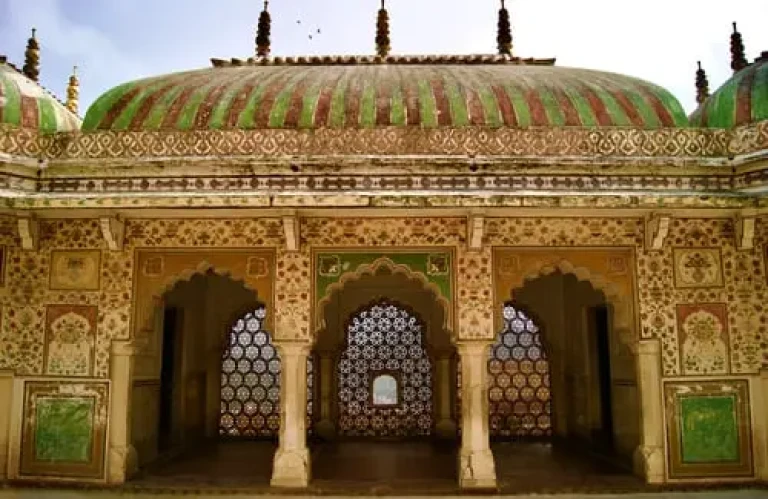
Zeena Mahal is where Queens and other female members of the royal family lived, a royal mansion. While the interior chambers offered a private sanctuary with elaborate balconies overlooking the gardens, the exterior courtyard served as a relaxing space. The queens had all they needed in their private space because each suite had its own kitchen and sitting area. The Zeena Mahal, which resembles regal row homes, is alluring because to its complex architectural details and beautiful surroundings.
Also read: Top 10 Places Every Traveler Should Experience in Rajasthan
Amber Fort's Unknown Facts
The Jaigarh Fort and the Amber Fort are connected via a covert tunnel. The royal family used this secret corridor as a means of escape during times of war or other calamities. It made it possible for them to go between the two forts invisibly and securely. Furthermore, Amber Fort is also known for its outstanding defensive qualities, including its towering walls and advantageous hilltop location, making it virtually impervious to hostile attacks.
According to legend, a sage put the stone (the Lingam) there to safeguard the fort. The Amber Fort is thought to be strong and unassailable against any threats as long as the stone is still present.
The Amber Fort's distinctive magic flower, which presents seven images from various perspectives, contributes to its attractiveness and draws tourists from all over the world. This intricately carved feature highlights the extraordinary skill and inventiveness of the artisans who constructed this spectacular monument, adding to its attractiveness. This element also captivates spectators and adds to its ageless beauty because to the meticulous workmanship and perfection visible in every part.
Attractions near Amber Fort

Panna Meena ka Kund, located just 1.3 km from Amber Fort, is another popular attraction in the area. This stepwell showcases stunning architectural design and is a favourite spot for tourists to explore and take memorable photographs. Its unique structure and historical significance make it a must-visit destination for those visiting Amber Fort.
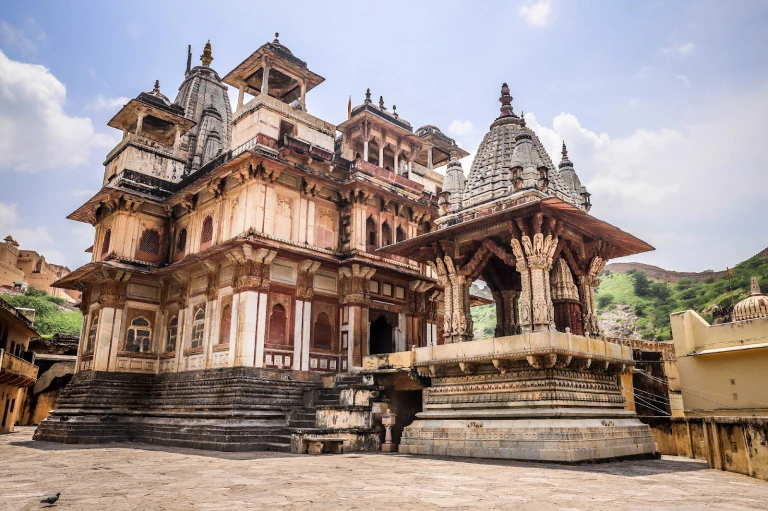
Another important site close to Amber Fort is the 1.7-kilometre-away Jagat Shiromani Temple. This old temple is renowned for its detailed carvings and lovely statues, which highlight the region's rich cultural past. While touring the area around Amber Fort, visitors may immerse themselves in the spiritual ambiance and awe of the architectural magnificence of this temple.
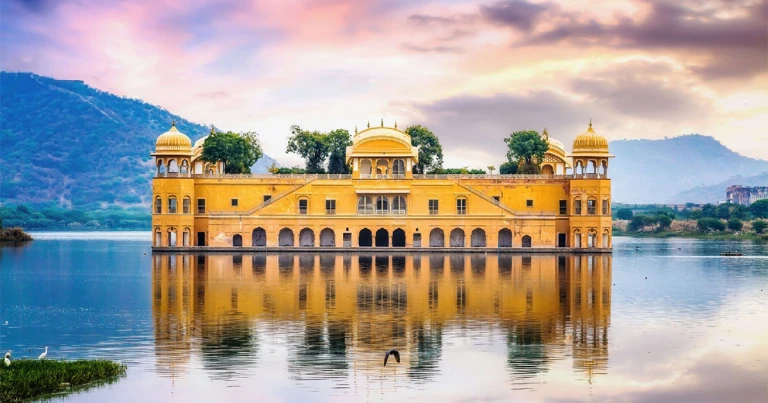
An additional well-liked destination close to Amber Fort is Jal Mahal (3.8 kilometers). The beautiful view from this magnificent mansion in the center of Man Sagar Lake makes it the ideal location for photographers. The beautiful construction of this water palace may be admired from a distance, or visitors can take a relaxing boat trip.
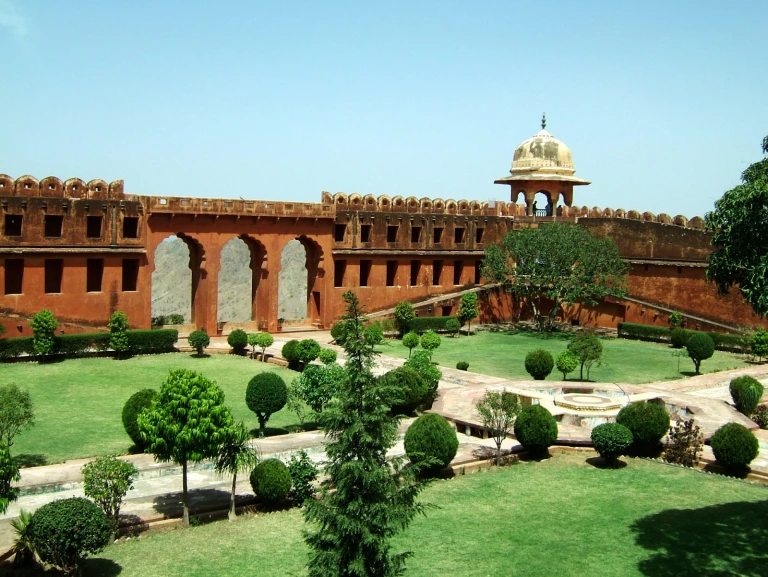
Jaighar Fort The major site close to Amber Fort is Jaighar Fort (6.9 kilometers). This old fort is renowned for its outstanding construction and panoramic views of the surrounding surroundings, which are spectacular. The gigantic "Jaivana," which is thought to be the biggest wheeled cannon in the world, is one of the fort's many buildings that visitors may examine. The Jaighar Fort also offers an insight into the impressive past and military capabilities of Jaipur's Rajput kings.
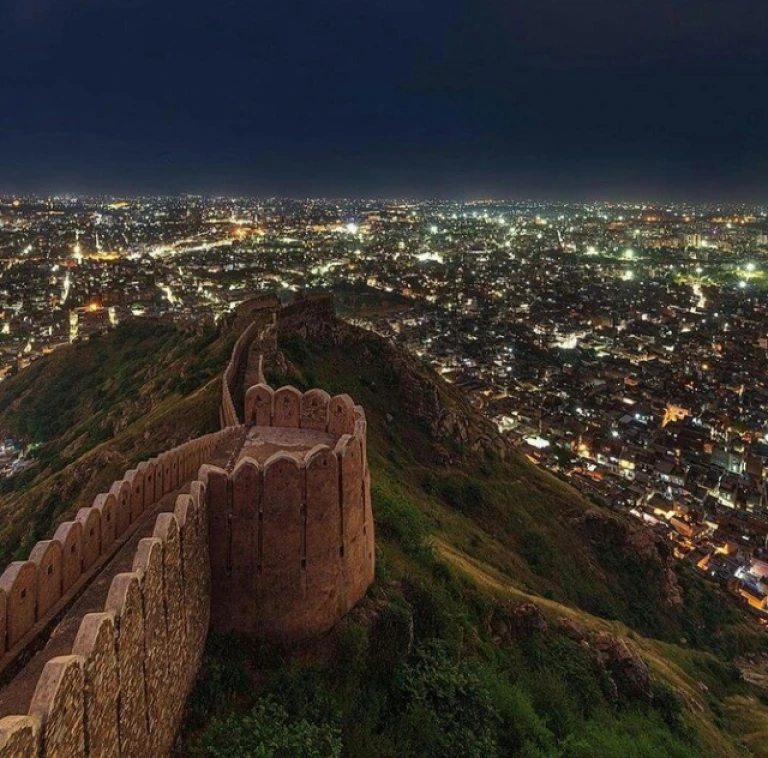
Another noteworthy location close to Amber Fort is Nahargarh Fort (10.6 kilometers). It provides spectacular views of Jaipur, often known as the Pink City, and is nestled on the Aravalli hills. The fort was initially constructed as a defensive fortification and then used as the royal family's retreat. Both history buffs and lovers of nature should visit because of its exquisite architecture and extensive history.
Also Read: 10 Must-See Sights in Jaipur, India’s Pink City (2023)
A visit to the Amber Fort in Jaipur is an absolute must for anyone exploring the cultural and historical treasures of Rajasthan. This UNESCO World Heritage Site stands as a living testament to the grandeur and architectural brilliance of the Rajput era. Its exquisite blend of Rajput and Mughal styles creates an immersive experience that transports visitors back in time to an era of resplendent opulence.
Published at
About Author
Prerna Dixit
Subscribe our Newsletter
Get our weekly tips and travel news!
Related Posts
10 amazing hacks for comfortable train journeys in India
Make your Indian train journey comfortable with these 10 hacks: choose the right class, pack essentials, stay hydrated, wear comfy clothing, charge devices, bring entertainment, prioritize safety, book lower berths, use travel apps, and socialize.
10 Amazing New Attractions in Singapore - Indian Travelers Guide 2025
Explore the new yet amazing attractions of Singapore
10 Backpacking Destinations in India that you must check out in 2024
In 2024, explore India's diverse beauty with these 10 must-visit backpacking destinations, offering mountains, beaches, and cultural gems for every traveler.
10 Beach Wedding Destinations in India for Magical Memories
A beach wedding in India is a dream come true for many couples, with its picturesque backdrop of golden sands, azure waters, and stunning sunsets. From the shores of Goa to the beaches of Kerala, this blog has the 10 best wedding locations for you!
10 Best Flea Markets in India for souvenirs and more
Embark on a shopping adventure in India with our guide to the 10 best flea markets, from the vibrant Dilli Haat to Goa's bohemian Anjuna market. Unearth unique souvenirs and experience the cultural richness of each location.
Latest Posts
Pahalgam Terror Attack: 28 Tourists Killed in Kashmir
A deadly terrorist attack in Pahalgam, Kashmi. Find out which areas are restricted, what safety measures are in place, and where it's still safe to travel.
10 Best Tourist Attractions in the Philippines for Indians
Plan your next getaway with this guide to the 10 best tourist attractions in the Philippines that Indian travellers will absolutely fall in love with.
You don't Need FASTag anymore? Everything you need to know!
No more FASTag from May 1st?
Zanskar Valley Travel Guide - Everything You Need to Know
Looking to get lost? Zanskar Valley might be for you.
10 Dreamy Experiences for Couples in Kashmir
Fancy some romantic experiences in Kashmir?


